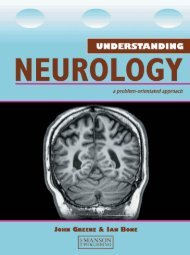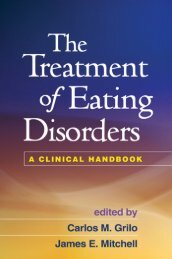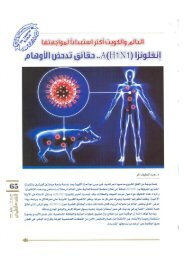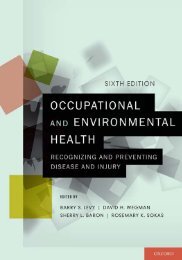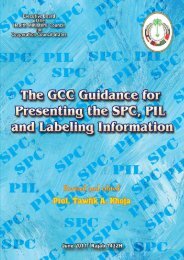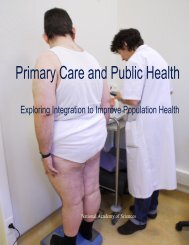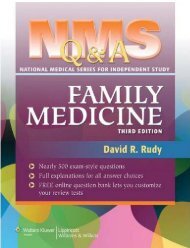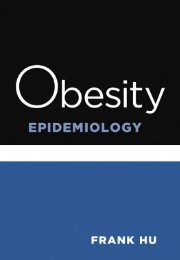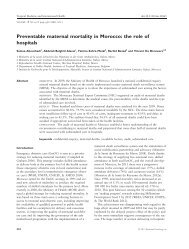Preventing Childhood Obesity - Evidence Policy and Practice.pdf
Preventing Childhood Obesity - Evidence Policy and Practice.pdf
Preventing Childhood Obesity - Evidence Policy and Practice.pdf
Create successful ePaper yourself
Turn your PDF publications into a flip-book with our unique Google optimized e-Paper software.
CHAPTER 14<br />
<strong>Evidence</strong> on the food environment <strong>and</strong> obesity<br />
Deborah A. Cohen<br />
The RAND Corporation, Santa Monica, CA, USA<br />
Summary <strong>and</strong> recommendations<br />
for practice<br />
Although weight is a function of the balance between<br />
what we eat <strong>and</strong> how much we exercise, a growing<br />
consensus points to food intake as the primary cause<br />
of the obesity epidemic. 1 – 3 The dominant thinking<br />
about the obesity epidemic is that it could be solved<br />
if people would exercise more self - control; thus, multiple<br />
interventions have been designed to increase self -<br />
efficacy, knowledge <strong>and</strong> skills with respect to nutrition<br />
<strong>and</strong> dieting. 4 – 6 However, most people know that if<br />
they eat too much <strong>and</strong> exercise too little, they will gain<br />
weight, <strong>and</strong> they also know that if they would just<br />
eat less <strong>and</strong> exercise more, they will lose weight.<br />
Furthermore, most people know that certain foods<br />
increase the odds of gaining weight, like chips, sodas,<br />
donuts, ice cream, c<strong>and</strong>ies <strong>and</strong> big portions of foods<br />
such as French fries <strong>and</strong> meat, yet these products continue<br />
to be among the best - selling items in America<br />
<strong>and</strong> other parts of the developed world. Knowledge<br />
appears to be less a problem than willpower.<br />
Yet lack of willpower appears to be an implausible<br />
explanation as well. Given that people tend to gain<br />
weight when they move to a society where more<br />
people are overweight, 7,8 it would mean that an individual<br />
’ s character changes just by emigrating. If loss<br />
of willpower was the source of the problem, it would<br />
suggest that there would be significant differences in<br />
willpower by race, gender, ethnicity <strong>and</strong> age <strong>and</strong>, more<br />
importantly, by country of residence or historical<br />
<strong>Preventing</strong> <strong>Childhood</strong> <strong>Obesity</strong>. Edited by<br />
E. Waters, B.A. Swinburn, J.C. Seidell <strong>and</strong> R. Uauy.<br />
© 2010 Blackwell Publishing.<br />
cohort. Is it conceivable that 30 years ago when fewer<br />
were overweight <strong>and</strong> obese, people had more willpower<br />
than they do now?<br />
This paper is the result of searching the literature<br />
for counterfactual evidence that would indicate that<br />
the dominant conceptualization that people eat too<br />
much because they lack self - control or have insufficient<br />
knowledge is plain wrong. Rather, the problem<br />
of obesity can be traced to the dramatic changes in our<br />
food environments <strong>and</strong> their interaction with human<br />
neurophysiology. This chapter describes how environments<br />
affect people in manners that defy personal<br />
insight or are below individual awareness. If people<br />
are unaware of the environmental forces <strong>and</strong> cues that<br />
are artificially making them feel hungry <strong>and</strong> leading<br />
them to eat too much, they cannot possibly control<br />
how much they eat.<br />
Introduction<br />
Eating is not a rational behavior. Eating is not like<br />
studying for a test, memorizing facts, underst<strong>and</strong>ing<br />
<strong>and</strong> manipulating sophisticated mathematical equations,<br />
painting a portrait or writing a book. It is not<br />
an advanced behavior, but a primitive one — one that<br />
is instinctual, hard - wired <strong>and</strong> in many ways uncontrollable.<br />
Humans are endowed with a metabolic<br />
pathway that allows them to store extra energy as fat.<br />
One might argue the existence of a pathway to create<br />
<strong>and</strong> store energy means that people were actually<br />
designed to eat too much. Given that more food is<br />
available in today ’ s world compared to the past, individuals<br />
are functioning normally <strong>and</strong> responding in<br />
the manner in which they were designed. Nothing is<br />
wrong with us. The problem is the environment in<br />
which we now live.<br />
113



